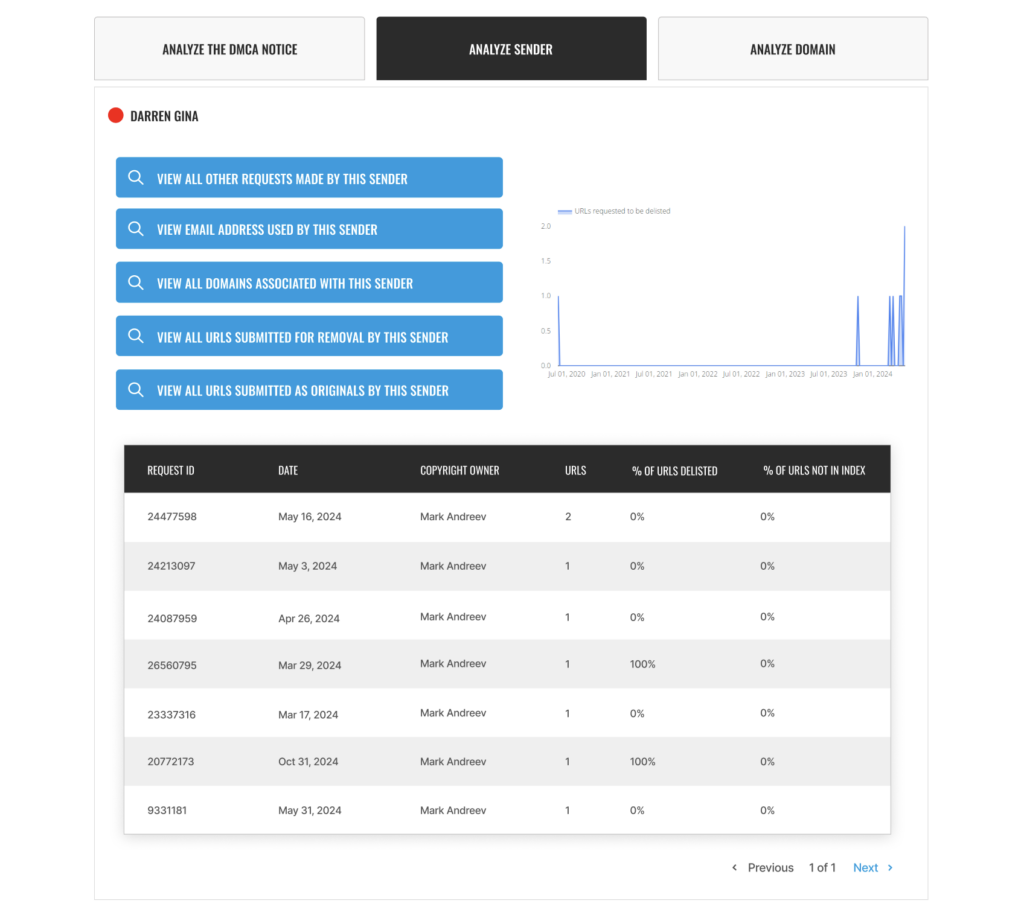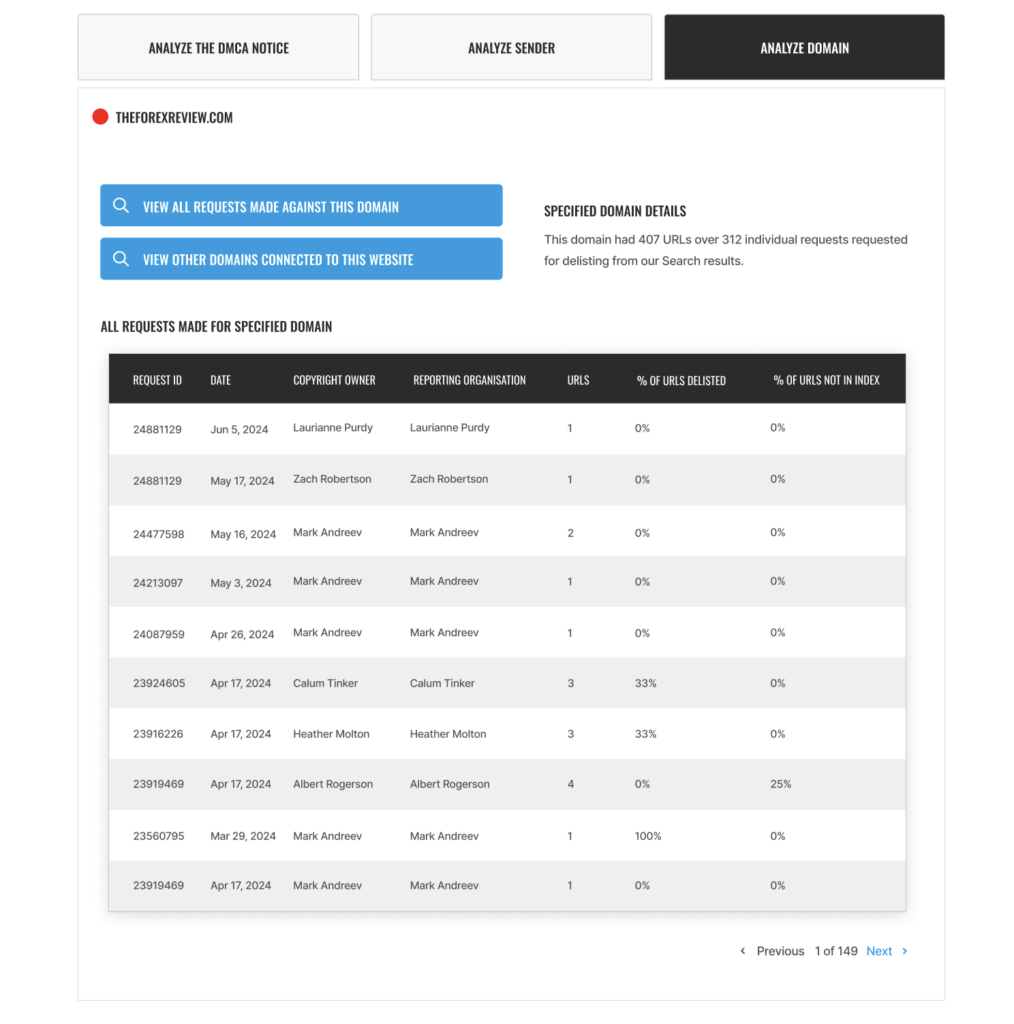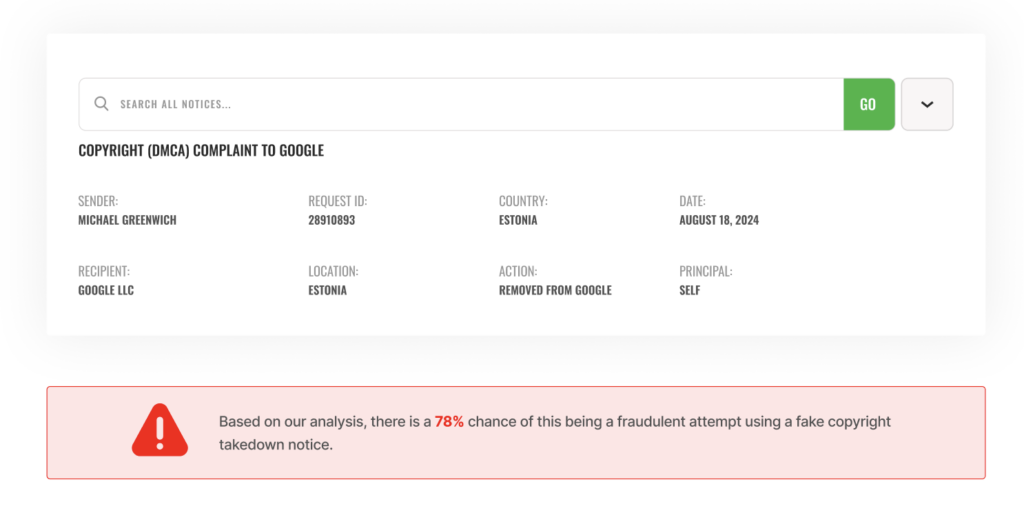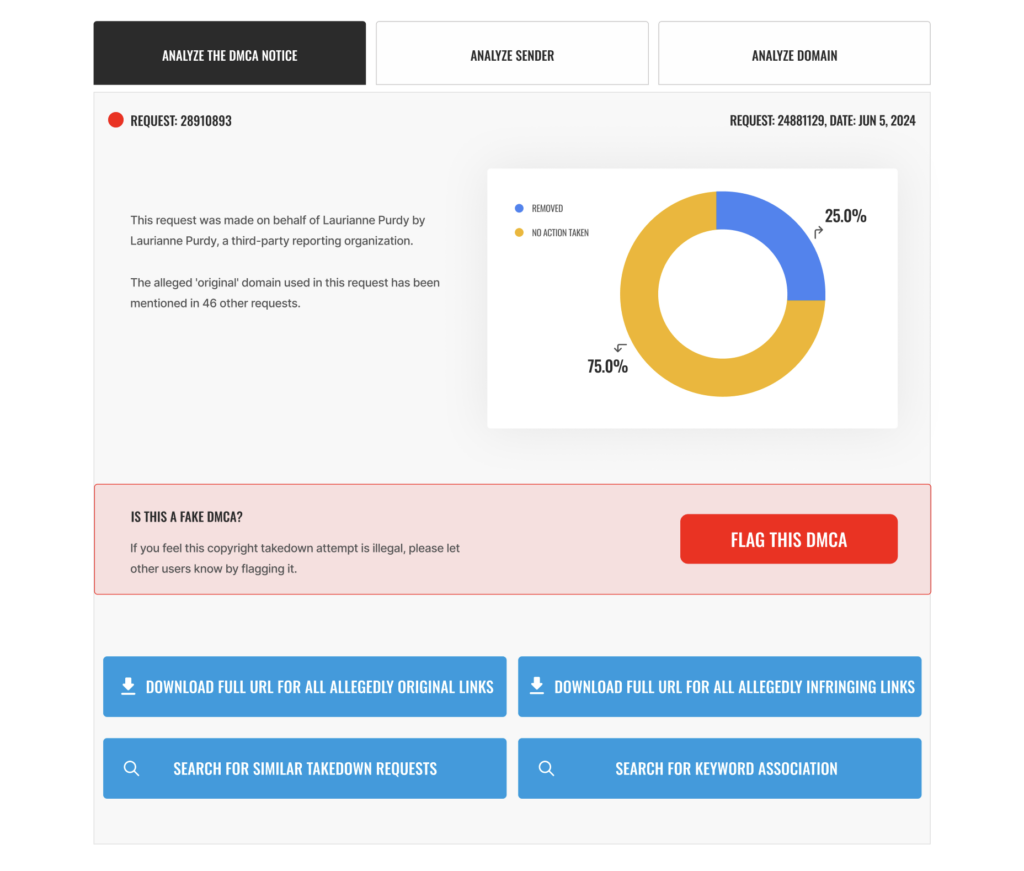What Happened?
ThinkMarkets, a prominent name in the online trading and forex industry, has been embroiled in controversies involving alleged misconduct and questionable practices, which the company appears to be actively trying to conceal. According to a detailed report on Myfxbook, ThinkMarkets has faced criticism over issues related to its ELM EA (Expert Advisor), raising concerns about transparency, misrepresentation, and a lack of proper customer protection.
Complaints against ThinkMarkets range from misleading claims regarding the performance of trading tools like the ELM EA to accusations of market manipulation and unfavorable conditions for retail traders. Many users have reported discrepancies between advertised returns and actual outcomes, citing losses far beyond the expected risks. Furthermore, allegations suggest that ThinkMarkets has engaged in tactics to obscure or remove unfavorable reviews and negative feedback, attempting to shape its public image and maintain trust within the trading community.

By attempting to suppress this damaging information, ThinkMarkets seeks to continue portraying itself as a reputable broker while avoiding accountability for these issues. Potential clients should be cautious and fully informed, given the company’s apparent unwillingness to address and rectify these controversies.

Analyzing the Fake Copyright Notice(s)
Our team collects and analyses fraudulent copyright takedown requests, legal complaints, and other efforts to remove critical information from the internet. Through our investigative reporting, we examine the prevalence and operation of an organized censorship industry, predominantly funded by criminal entities, oligarchs, and disreputable businesses or individuals. Our findings allow internet users to gain insight into these censorship schemes’ sources, methods, and underlying objectives.
List of Fake Copyright Notices for ThinkMarkets
| Number of Fake DMCA Notice(s) | 1 |
| Lumen Database Notice(s) | https://lumendatabase.org/notices/43919876 |
| Sender(s) | NovaSphere Technologies |
| Date(s) | Aug 19, 2024 |
| Fake Link(s) Used by Scammers | https://www.thinkmarkets.com/en/ |
| Original Link(s) Targeted | https://www.myfxbook.com/members/innovative/thinkmarkets-elm-ea/7429238 |
Evidence and Screenshots

How do we investigate fake DMCA notices?
To accomplish this, we utilize the OSINT Tool provided by FakeDMCA.com and the Lumen API for Researchers, courtesy of the Lumen Database.
FakeDMCA.com is the work of an independent team of research students and cybersecurity professionals, developed under Project UnCensor. Their OSINT Tool, designed to uncover and analyze takedown notices, represents a significant step forward in combating these abusive practices. It has become a valuable resource, increasingly relied upon by journalists and law enforcement agencies across the United States.
Lumen, on the other hand, is an independent research initiative dedicated to studying takedown notices and other legal demands related to online content removal. The project, which operates under the Berkman Klein Center for Internet & Society at Harvard University, plays a crucial role in tracking and understanding the broader implications of such requests.
What was ThinkMarkets trying to hide?
ThinkMarkets is a global online brokerage firm specializing in forex, contracts for difference (CFDs), and other financial trading products. Founded with the aim of providing retail traders with easy access to financial markets, ThinkMarkets offers trading tools and platforms for both beginner and advanced traders. The company has a reputation for offering a range of financial instruments and technology-driven services that cater to traders worldwide. Despite its global presence and purported reliability, ThinkMarkets has recently come under scrutiny for allegations of misconduct and controversial practices, particularly concerning its trading tools.
Based on the report found on Myfxbook, ThinkMarkets has faced a variety of negative feedback and allegations related to its services, particularly focusing on the ELM EA (Expert Advisor). These issues revolve around a lack of transparency, potential misrepresentation, and trading practices that disadvantage retail traders. The allegations and complaints that ThinkMarkets seems to be trying to suppress include:
- Misleading Claims Regarding the ELM EA Performance: Users have expressed significant concerns about the performance of ThinkMarkets’ ELM EA. There have been numerous reports suggesting discrepancies between the advertised returns of the ELM EA and the actual outcomes experienced by traders. Many investors were led to believe they would receive consistent profits, but instead experienced considerable losses that were much higher than expected. The disparity between the marketed performance and real outcomes has caused many to accuse ThinkMarkets of misrepresentation.
- Market Manipulation Allegations: Several users have reported concerns about potential market manipulation and unfair trading conditions. These allegations include claims that ThinkMarkets engaged in practices such as manipulating spreads, delays in trade execution, and unexplained slippage, all of which negatively impacted the trading results of their clients. Such tactics, if true, would indicate a deliberate attempt to exploit customers, leading to losses and diminished trust in the platform.
- Lack of Proper Customer Protection: Complaints also highlight the lack of customer protection mechanisms at ThinkMarkets. Traders have mentioned difficulties in withdrawing funds, lack of response from customer service, and issues with the transparency of fees and charges. This lack of support has left some users feeling vulnerable and unsupported, especially in cases where significant losses were incurred.
- Suppression of Negative Reviews and Feedback: ThinkMarkets has allegedly engaged in efforts to suppress negative reviews and critical feedback about its services. Some users have reported that their reviews or complaints have been removed from certain forums or discussion boards. The company seems to be actively attempting to curate its online reputation by limiting the visibility of adverse news and feedback, ensuring that potential clients see only the positive aspects of their services.
- Use of Aggressive Tactics to Protect Reputation: ThinkMarkets is also reported to have used aggressive tactics, such as legal threats, to prevent the spread of negative information. This is in line with efforts to control the narrative about the company’s operations and to keep its controversial practices from affecting potential customer interest. By censoring unfavorable reviews, ThinkMarkets aims to present itself as a reliable broker while avoiding accountability for its controversial business practices.
ThinkMarkets’ attempts to hide its shady past and censor damaging news suggest a focus on maintaining a positive public image while ignoring critical issues that affect traders. The lack of transparency, allegations of manipulation, and aggressive censorship efforts have raised questions about the integrity of ThinkMarkets’ business practices. Prospective clients should exercise caution and conduct thorough research before choosing to trade with ThinkMarkets.
Only ThinkMarkets benefits from this crime.

Since the fake copyright takedown notices were designed to remove negative content for ThinkMarkets from Google, we assume ThinkMarkets or someone associated with ThinkMarkets is behind this scam. It is often a fly-by-night Online Reputation agency working on behalf of ThinkMarkets. In this case, ThinkMarkets, at best, will be an “accomplice” or an “accessory” to the crime. The specific laws may vary depending on the jurisdiction. Still, the legal principle generally holds that if you actively participate in planning, encouraging, or facilitating a crime, you can be charged with it, even if you did not personally commit it.
How do we counteract this malpractice?
Once we ascertain the involvement of ThinkMarkets (or actors working on behalf of ThinkMarkets), we will inform ThinkMarkets of our findings via Electronic Mail.
Our preliminary assessment suggests that ThinkMarkets may have engaged a third-party reputation management agency or expert, which, either independently or under direct authorization from ThinkMarkets, initiated efforts to remove adverse online content, including potentially fraudulent DMCA takedown requests. We will extend an opportunity to ThinkMarkets to provide details regarding their communications with the agency or expert, as well as the identification of the individual(s) responsible for executing these false DMCA notices.
Failure to respond in a timely manner will necessitate a reassessment of our initial assumptions. In such an event, we will be compelled to take appropriate legal action to rectify the unlawful conduct and take the following steps –
- Inform Google about the fraud committed against them.
- Inform the victims of the fake DMCA about their websites.
- Inform relevant law enforcement agencies
- File counter-notices on Google to reinstate the ‘removed’ content
- Publish copies of the ‘removed’ content on our network of 50+ websites
By investigating the fake DMCA takedown attempts, we hope to shed light on the reputation management industry, revealing how ThinkMarkets and companies like it may use spurious copyright claims and fake legal notices to remove and obscure articles linking them to allegations of fraud, tax avoidance, corruption, and drug trafficking…
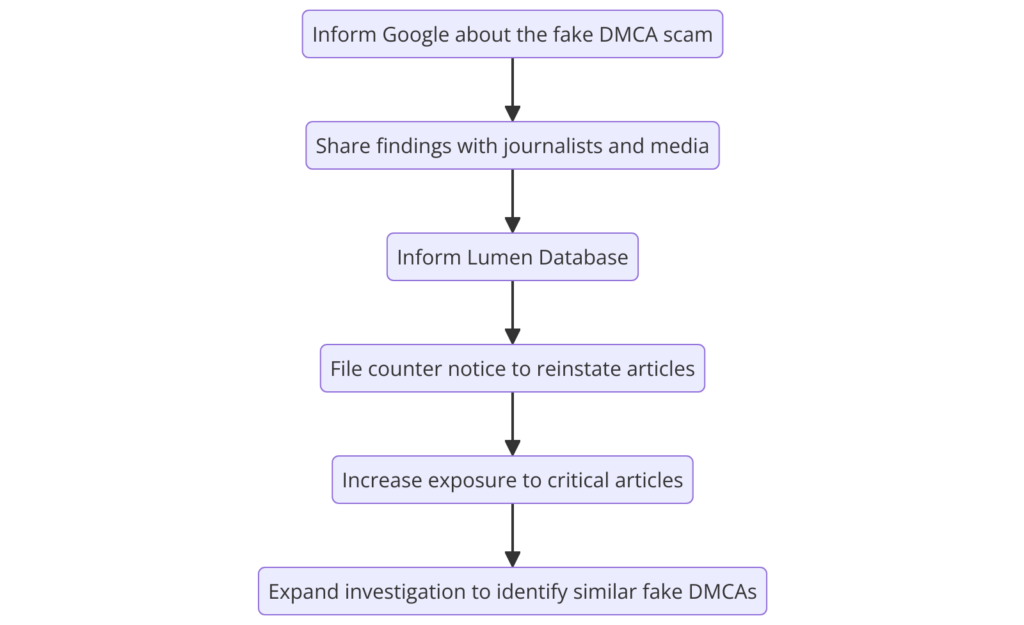
Since ThinkMarkets made such efforts to hide something online, it seems fit to ensure that this article and our original review of ThinkMarkets, including but not limited to user contributions, remain a permanent record for anyone interested in ThinkMarkets.
A case perfect for the Streisand effect…
Potential Consequences for ThinkMarkets
Under Florida Statute 831.01, the crime of Forgery is committed when a person falsifies, alters, counterfeits, or forges a document that carries “legal efficacy” with the intent to injure or defraud another person or entity.
Forging a document is considered a white-collar crime. It involves altering, changing, or modifying a document to deceive another person. It can also include passing along copies of documents that are known to be false. In many states in the US, falsifying a document is a crime punishable as a felony.

Additionally, under most laws, “fraud on the court” is where “a party has sentiently set in motion some unconscionable scheme calculated to interfere with the judicial system’s ability impartially to adjudicate a matter by improperly influencing the trier of fact or unfairly hampering the presentation of the opposing party’s claim or defense.” Cox v. Burke, 706 So. 2d 43, 46 (Fla. 5th DCA 1998) (quoting Aoude v. Mobil Oil Corp., 892 F.2d 1115, 1118 (1st Cir. 1989)).
Is ThinkMarkets Committing a Cyber Crime?
Yes, it seems so.





